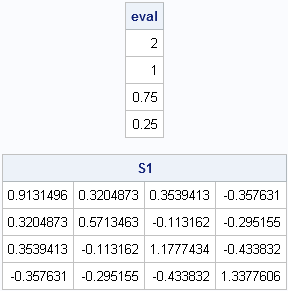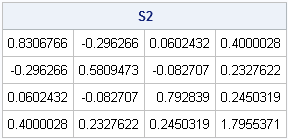In a previous post I showed how to implement Stewart's (1980) algorithm for generating random orthogonal matrices in SAS/IML software. By using the algorithm, it is easy to generate a random matrix that contains a specified set of eigenvalues.
If D = diag(λ1, ..., λp) is a diagonal matrix and Q is a pxp orthogonal matrix, then Q`DQ has eigenvalues λ1, ..., λp. Therefore if you choose Q at random, you obtain a random matrix with a given set of eigenvalues, as shown in the following statements:
proc iml;
load module=RndOrthog; /* load or define modules here */
start RndMatWithEigenval(lambda);
n = ncol(lambda); /* assume lambda is row vector */
Q = RndOrthog(n);
return( Q`*diag(lambda)*Q );
finish;
lambda = {2 1 0.75 0.25};
call randseed(1234);
S1 = RndMatWithEigenval(lambda); /* eigenvalues are lambda */
eval = eigval(S1);
print eval;
print S1; |

If you call the function a second time, you get a different matrix with the same eigenvalues:
S2 = RndMatWithEigenval(lambda); /* eigenvalues are lambda */ print S2; |

The ability to generate random matrices with specified eigenvalues is useful in simulation studies. Stewart's original motivation was to generate matrices with arbitrary condition number. The condition number of a matrix (in the two-norm) is the square root of of the ratio of the largest eigenvalue to the smallest eigenvalue. The condition number is important in numerical analysis because matrices with large condition numbers often lead to numerical instabilities in matrix computations. The algorithm implemented in this article provides a convenient way to generate matrices with an arbitrary condition number.
You can use these matrices in statistical simulations as well. If all eigenvalues are positive, then the resulting matrix is symmetric and positive definite. Therefore, it is a covariance matrix. Thus, this article shows how to create a random covariance matrix that has a specified "spectrum" or set of (positive) eigenvalues. You can use the covariance matrix to generate random multivariate normal data.
It is possible to use this procedure in an iterative method to obtain a random correlation matrix that has a specified set of eigenvalues. For a correlation matrix, the eigenvalues must sum to 1 and be positive.
You can download the modules that generate random covariance matrices.

6 Comments
Hi, thanks for the explanation on how to simulate a random matrix with specified eigenvalues. I can't find the future blog post where the random matrix is transformed into a correlation matrix with the same set of eigenvalues. Is it on this webpage?
This post is almost 13 years old, so I cannot remember what I might have been thinking back then. I cannot locate a follow-up post. When I think about this problem today, the case of a correlation matrix seems harder than the covariance case. I do not see an easy way to construct a correlation matrix with a specified set of eigenvalues (which must sum to n for an nxn matrix). You cannot merely use the spectral decomposition and try to construct Q`*diag(lambda)*Q because that matrix is not likely to be a correlation matrix with 1s on the diagonal. In short, I think my statement is wrong, which is why there was no follow-up post. Sorry about that.
Thank you for your reply. I have not found any way to do it either - and will not continue trying. I read someone suggesting to apply Givens rotations to convert the random matrix into a correlation matrix, but I do not know how to do it.
OK. I figured out a method. See "Generate correlation matrices with specified eigenvalues" (Wicklin, 2024).
Pingback: Generate correlation matrices with specified eigenvalues - The DO Loop
Pingback: Matrix norms and spectra - The DO Loop